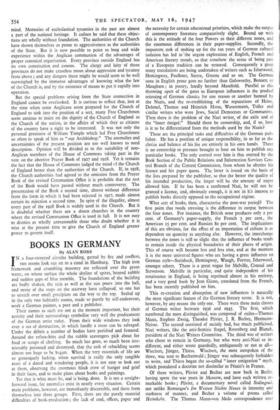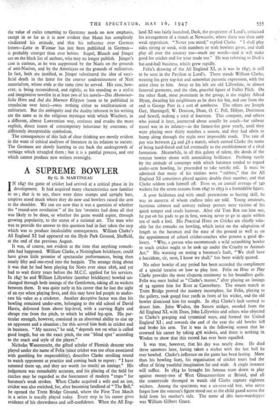BOOKS IN GERMANY
By ALAN ROSS
IN a four-storeyed circular building, gutted by fire and roofless, two rooms look out on to a canal in Hamburg. The high iron framework and crumbling masonry are reflected over the green water, on whose surface the whole skyline of spires,'heaped rubble and sudden gaps of blue tremble. The foundations of the building are badly shaken, the rain as well as the sun pours into the hall, and many of the steps on the stairway have collapsed, so one has to stretch over small precipices on the way to the top. Sealed up in the only two habitable rooms, made so purely by self-endeavour, work a German painter, a poet and a publisher.
Their names as such are not at the moment important, but their activity and their surroundings symbolise very well the predicament of the German artist today. From their wide windows they look over a sea of destruction, in which hardly a stone can be salvaged. Under the debris a number of bodies have perished and festered. Around the refuse-bins and the rubble scavengers pick about for food or scraps of clothing. So much has gone, so much been irre- trievably poisoned and destroyed, that the task of rebuilding seems almost too huge to be begun. When the very essentials of life are so grotesquely lacking, when survival is really the only tangible asset of a dazed and wandering people, it is not easy to look out at them, observing the enormous black crow of hunger and grief in their faces, and to make plans about books and paintings.
Yet that is what must be, and is being, done. It is not a straight- forward issue, for anomalies exist in nearly every situation. Certain main problems, however, are immediately discernible, and these form themselves into three groups. First, there are the purely material difficulties of book-production ; the lack of coal, offices, paper and the necessity for certain educational priorities, which make the output of contemporary literature comparatively slight. Bound up with this is the attitude of the four Powers to their different zones, and the enormous differences in their paper-supplies. Secondly, the important task of making up for the ten years of German cultural isolation has led to `the urgent exploration of English, French and American literary trends, so that somehow the sense of being part of a European tradition can be restored. Consequently a great many translations are being undertaken of writers such as Isherwood, Hemingway, Faulkner, Sartre, Greene and so on. The German • taste in English prose goes no further than Galsworthy, Bennett or Maugham ; in poetry, hardly beyond Masefield. Parallel to this throwing open of the gates to European influences is the gradual reissuing of German classics for one reason or another banned by the Nazis, and the re-establishing of the reputations of Heine, Delunel, Thomas and Heinrich Mann, Wassermann, Toiler and similar writers who were Jews, Social Democrats or Communists. Then there is the problem of the Nazi writer, of the exile and of the "inner émigré." Should there be censorship, and, if so, how is it to be differentiated from the methods used by the Nazis?
These are the principal tasks and difficulties of the German pub- lisher. He has a position of unique responsibility, in so far as the choice and balance of his list are entirely in his own hands. There is no censorship or pressure brought to bear on him to publish any particular books. The only control over him is that exerted by the Book Section of the Public Relations and Information Services Con- trol Branch of the Control Commission, from whom he obtains his licence and his paper quota. The latter is issued on the basis of the lists prepared by the publisher, so that the better the quality of his intended production, the larger will be the amount of paper allowed him. If he has been a confirmed Nazi, he will not be granted a licence, and, obviously enough, it is not in his interest to publish books directly opposed to the occupational regime.
What sort of books, then, characterise the post-war period? The first point that needs stressing is the difference in output between the four zones. For instance, the British zone produces only 2 per cent. of Germany's paper-supply, the French 3 per cent., the American 15 per cent. and Russian 8o per cent. The implications of this are obvious, for the effect of an importation of culture is as dependent on quantity as anything else. However, the interchange between the zones is still so slight that the influence of books tends to remain inside the physical boundaries of their places of origin. This of course will become less and less true, and at the moment it is the more universal figures who are having a great influence on German style—Steinbeck, Hemingway, Waugh, Forster, Isherwood, amongst others. There is a great vogue for Melville, Conrad and Stevenson. Melville in particular, and quite independent of his renaissance in England, is being reprinted almost in his entirety, and a very good book by Jean Giono, translated from the French, has been recently published on him.
This re-creation and absorption of new influences is naturally the most significant feature of the German literary scene. It is not, however, by any means the only one. There were three main classes of German writer between 1936 and 1945. The first, which numbered the most distinguished, was composed of exiles—Thomas Mann, Stephen Zweig, Theodor Plivier, J. R. Becher, Hermann- Neisse. The second consisted of mainly bad, but much publicised, Nazi writers, like the anti-Semitic Stapel, Rosenberg and Blunck, president of the Nazi Writers Committee. The third was of writers who chose to remain in Germany, but who were anti-Nazi or in- different, and either wrote guardedly, ambiguously or not at all- Wiechert, Junger, Thiess. Wiechert, the most outspoken of the three, was sent to Buchenwald ; Junger was subsequently forbidden to write, and Thiess began the so-called "inner emigration" myth, which postulated a doctrine not dissimilar to Petain's in France.
Of these writers, Plivier and Becher are now back in Berlin, having spent the war years •in Moscow, and have each written re- markable books ; Plivier, a documentary novel called Stalingrad, not unlike Remarque's Im Westen Nichts Neues in intensity and starkness of manner, and Becher a volume of poems called Heimkehr. The Thomas Mann-von Molo correspondence over the value of exiles returning to Germany needs no new emphasis, except in so far as it is now evident that Mann has completely vindicated his attitude, and that his influence over German letters—Lotte in Weimar has just been published in German— is probably stronger than ever before. Stapel, Blunck and Ifinger are on the black list of authors, who may no longer publish. Junger's case is curious, as he was suppressed by the Nazis on the grounds of anti-Nazism, and by the Arnericans on the grounds of militarism. In fact, both are justified, as Jiinger substituted the idea of sacri- ficial death in the latter for the coarser tendentiousness of Nazi materialism, whose ends at the same time he served. His case, how- ever, is being reconsidered, and rightly, as his standing as a stylist and imaginative novelist in at least two of his novels—Das Abenteuer- liche Herz and Auf die Marmon Klippen (soon to be published in translation over here)—owes nothing either to totalitarianism or militarism. But the ambiguity and the duality inherent in his writing are the same as in the religious mystique with which Wiechert, in a different, almost Lawrentian way, confuses and evades the more explicit, direct issues of contemporary behaviour by overtones of differently interpretable symbolism.
. The consequences of this lack of clear thinking are mostly evident in the want of critical analyses of literature in its relation to society. The Germans are slowly learning to cut back the undergrowth of verbiage which strangled them ; but it is a painful process, and one which cannot produce new writers overnight.



































 Previous page
Previous page